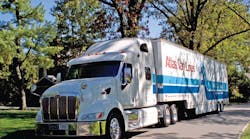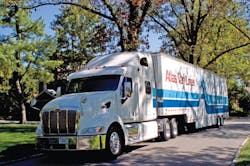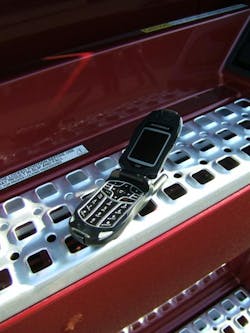By that I mean the paper-laden processes that used to consume a goodly portion of the driver’s day – filling out logbooks, collecting fuel receipts, organizing freight bills and using dog-eared map books to plan out daily routes – are increasingly going by the wayside.
Heck, it even seems the venerable citizen’s band (CB) radio, long a staple of the trucker’s way of life, is becoming something of a relic.
That’s where the “King of the Road” findings come into play, as Atlas Van Lines found that 66% of its drivers polled in this survey use smart phones, a 6% increase from 2012, with the iPhone outpacing Android phones (58% to 38%) as the model of choice.
Atlas also found that Verizon Wireless remains the preferred network of choice for the second consecutive year.More broadly, the survey Atlas conducted found that drivers are continuing to use technology to stay more connected while on the road, with across-the-board increases in email and Internet usage as more than three-fourths of the drivers polled check email daily, with 84% accessing the Internet on a daily basis and 56% checking social networking sites like Facebook or Twitter every day.
Look, too, at this story about how a variety of smart phone applications are being developed to help replace the need for a CB radio.
Paul Miller Trucking, based outside of Philadelphia, noted in a press release earlier this month that while the CB radio (among other communication devices) used to be recognized as “a trucker's most essential tool for carrying out their mission,” it now seems like such older technology may need to step aside.
Truck drivers of yesteryear used to rely on pay phones to keep in touch with dispatch, the carrier noted, but now a plethora of smart phone apps provides crucial details almost immediately. “There are apps containing maps, health tips, entertainment, traffic reports, weather updates, fuel prices, meal deals, and much more,” Paul Miller stated. “One of the best aspects of most smart phones is their up-to-date GPS capability. They can now avoid restricted and closed roads with ease.”
Of course, there are plenty of dangers posed by the use of smart phones while behind the wheel, too, which shows that working in a more “digital” truck cab comes with its own set of risks to be managed.
Still, this increase in smart phone usage is yet another signpost along the road of change that the role of the truck driver is traveling these days.





